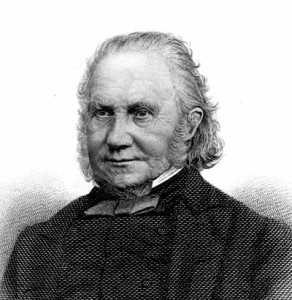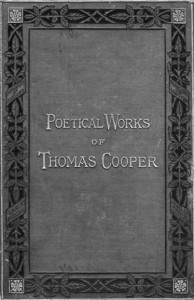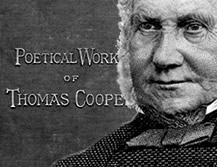Description
 Meet Thomas Cooper, the Chartist who adopted the voice of Calanus, the Brahmin whom Alexander the Great visited in India, to prophesy global liberation and universal suffrage. Cooper wrote his epic poem The Purgatory of Suicides in the early 1840s in Stafford Gaol, where he was imprisoned as a Chartist after being convicted of sedition. Calanus is found in several ancient sources for Alexander the Great, and Cooper puts the ancient spokesman of spiritual freedom to innovative use by recasting his views in political terms.
Meet Thomas Cooper, the Chartist who adopted the voice of Calanus, the Brahmin whom Alexander the Great visited in India, to prophesy global liberation and universal suffrage. Cooper wrote his epic poem The Purgatory of Suicides in the early 1840s in Stafford Gaol, where he was imprisoned as a Chartist after being convicted of sedition. Calanus is found in several ancient sources for Alexander the Great, and Cooper puts the ancient spokesman of spiritual freedom to innovative use by recasting his views in political terms.
Cooper was born illegitimately in 1805 to a fisherman’s daughter and an itinerant dyer. He became one of the most remarkable of all the Chartist autodidacts. He taught himself Greek and Latin and became a tutor at the Lincoln Mechanics Institute. By 1843 he had become a convinced Chartist and worked as a journalist on a radical newspaper in Leicester. Cooper was not only committed to universal male suffrage and agitation on behalf of the poor, but on an international level he was opposed to imperialism: one of his most inflammatory speeches, delivered at Hanley in August 1842, began with a catalogue of ‘conquerors, from Sesostris to Alexander, from Caesar to Napoleon, who had become famous in history for shedding the blood of millions…’ He described ‘how the conquerors of America had nearly exterminated the native races….’ He excoriated ‘British wrongdoing in Ireland’.

The first six stanzas of The Purgatory of Suicides are a poetical version of a speech Cooper delivered in 1842 to the colliers on strike in the Staffordshire Potteries, as a result of which he was arrested for arson and violence. His Calanus provides a climax for a list of various Greek sages. Calanus tells the Greeks Empedocles and Cleombrotus of his utopian vision of the future — a spiritual allegory for the Chartists’ vision of a levelled and democratic society. He says that the strong will end up seeking to break bread for weeping orphans, and ‘Knowledge, the great Enfranchiser, is near!’ The ‘wide world’s helots’ are about to break their bonds. That an ancient Indian sage should be selected to lecture ancient Greeks on the topics of feeding the destitute as well as enfranchising and educating the wide world’s ‘helots’ reveals Cooper’s intuition that British commercial interests in India were inextricably linked to the predicament of the working classes internationally.
For more on this subject please read the following groundwork article.




